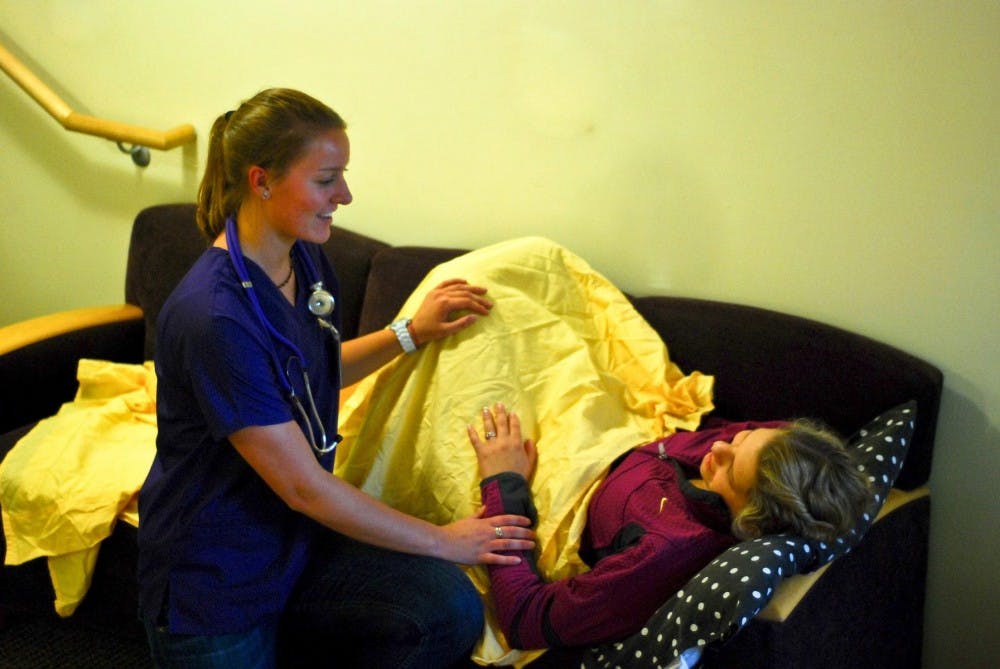Nursing students learn how to handle intimate situations as they prepare for the real-life profession
By Amanda Blas Staff Writer blas13@up.edu
To some, the sense of touch may not seem to be a big deal. But for the UP School of Nursing students, touch means a lot.
As nursing students start their clinicals, they begin to interact with patients. During this time, students realize the importance of knowing how to touch patients. With duties such as bathing and chest examinations, nursing involves an intimate kind of touch.
"There's no other health profession that physically touches patients the way nurses do," nursing instructor Dr. Chad O'Lynn said.
According to O'Lynn, intimate touch refers to the touching of areas of the body that are likely to produce feelings of discomfort, anxiety or fear.
Nursing instructor Lorretta Krautscheid said the anxiety affects everyone.
"It's not just the patient," Krautscheid said. "Nurses get nervous about it, too. Everyone does."
To prepare for these awkward and uncomfortable situations, nursing students take a one-session intimate touch lab before starting their clinicals.
The lab, run by O'Lynn and Krautscheid, started in 2006 to help nursing students be successful in their clinicals.
"Before clinicals, we haven't worked with real people," senior nursing major Madeleine Richardson said. "This prepares us for working with real clients."
The course is unique to UP's nursing program, and O'Lynn and Krautscheid decided to hold the lab because of the way the intimate touch is often ignored.
"Books always say you need to be sensitive," O'Lynn said. "But it doesn't say what to do, how to touch or what to say."
During the lab, nursing students watch videos and engage in lecture to gain a better understanding of the difference between the right approach and what O'Lynn calls the 'not-so-sensitive' approach of touching patients.
"We basically talked about what was appropriate when it came to touching patients, especially in intimate areas, and how exactly to do it in a professional manner," junior nursing student Max Lily said.
According to junior nursing major Madeleine Baliton, the lab taught students how to properly bathe patients, clean genital and rectal parts of the body and take pulses.
"We try to teach them how to do nursing procedures in the least invasive way possible," Krautscheid said. "We also promote communication and giving the patients options."
Though both men and women discuss the same general topics in the intimate touch lab, the two genders are separated into different classes. According to Krautscheid, this is done to address the questions that are unique to each gender.
"There are some questions guys or girls won't ask in a mixed class," Krautscheid said. "This helps address those concerns in a timely manner."
In addition, the men's class is a bit longer than the women's class. According to O'Lynn, this has to do with the number of male nurses as compared to female nurses.
"There's a significantly smaller amount of guy nurses compared to girls, so guys are able to do more hands-on practice with the mannequins during the lab, while girls usually get to practice on top of their other classes," O'Lynn said.
Male nursing students feel a longer class period is needed because the topic is more awkward for them than for females.
"Guys might not be able to handle this kind of thing as well," senior nursing major Zach Eaton said. "Guys need a little more guidance."
Lily agreed.
"Nursing is a woman-based profession," Lily said. "It's understandable that they need more time to talk about intimate touch with us."
Some nursing students, such as Eaton, were less than thrilled to take the intimate touch lab.
"I was concerned about the lab because of the name," Eaton said. "I can't say I was really comfortable going into an intimate touch lab."
However, Eaton found the intimate touch lab to be important to his success at his clinicals.
"Overall, the experience was beneficial," Eaton said. "It taught me how to deal with people of both the same and opposite sex in healthcare."
Nursing students also found that the lab reminded them they are dealing with actual people, not just with body parts.
"It reminds us you have to treat your patients with respect and privacy," Richardson said.
Krautscheid agrees, finding that the lab opens nursing students' eyes to the fact that they will be having real human interaction.
"They learn they can't behave the same way they do with plastic mannequins that they've practiced on," Krautscheid said. "They learn they're working with real people now. And while it's uncomfortable, it's something they can overcome."








